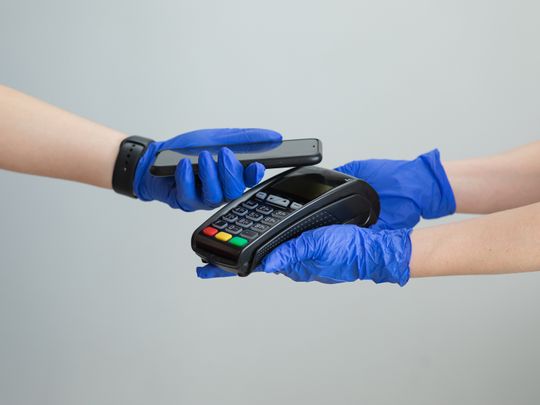
Visa: It's time to think beyond the swipe
Why Covid-19 may very well be the end of a cash society
by Marcello Baricordi | Special to Gulf NewsOnce upon a time, handing over your credit card was akin to making a style statement.
Fashionably flashing your card around sent the message that you have arrived to spend, and the power and convenience of paying with plastic – originally considered a digital revolution in the financial industry – was unmatchable.
Payment behaviour
Before Covid-19, the move to digital payments and away from cash had been steady but slow in some MENA (Middle East and North Africa) markets. The pandemic crisis has almost fast-tracked the shift in payment behaviour. Today, unless faced with a contactless acceptance terminal, many customers don’t want to physically part with their card. And contributing to this trend is the desire to avoid frequently touched objects and surfaces, including the use of potentially germ-laden cash which changes hands multiple times a day. Cash now carries an extra stigma in the minds of the consumers.
As the world continues to battle the first major pandemic in a century, card owners simply don't want to swipe anymore. They want to play safe and go contactless, and merchants have been compelled to adapt if they want to continue transacting with their customers.
The payments landscape has already forever changed, and every business has no choice but to prepare, build and run a digital-first business to survive and thrive, in a post-Covid-19 world.- Marcello Baricordi, Visa’s General Manager for the Middle East & North Africa
Contactless payments
Visa’s Back to Business study, which assessed the financial impact of Covid-19 on small and micro businesses (SMBs) worldwide, found that using contactless payment methods has been among the most important safety measures for stores to follow amid the coronavirus outbreak.
Millions of shoppers across the globe, and nine out of every 10 consumers in the UAE, have changed how they pay for purchases, including preferring to shop online when possible (59 per cent). In fact, our study also found that four out of 10 customers are now avoiding the use of cash (40 per cent) and more than half are using contactless payments (52 per cent).
#WhereYouShopMatters
In parallel, three in five small businesses in the UAE (59 per cent, compared to 33 per cent globally) reported their business has accepted less or stopped accepting cash during the pandemic. In fact, outside the US, more than 60 per cent of Visa transactions now occur with a tap.
Much like wearing face masks and regularly sanitising your hands, touchless payments have become a critical precaution at checkout time – which is why Visa has been working with merchants and fintech startups around the world to reimagine the Visa card as a contactless payment device and to enable contactless experiences beyond the plastic.
While the sudden, record-breaking surge in demand for contactless commerce has been sparked by Covid-19, this is hardly a trend that will fade after the pandemic. Rather, the payments landscape has already forever changed, and every business has no choice but to prepare, build and run a digital-first business to survive and thrive, in a post-Covid-19 world.
Small businesses adapt to the new normal
Visa's Covid-19 Impact Tracker found that 80 per cent of consumers in the UAE have made changes to their shopping behaviour and close to half said they intend to continue the same habits post-pandemic.
As all businesses continue striving to stay relevant, small and micro businesses in particular must work to build stronger, digital-first businesses. These businesses account for more than 90 per cent of businesses worldwide and global economic recovery and job creation is critically dependent on their ability to sustain.
According to the Impact Tracker, small businesses in the UAE – which make up more than 94 per cent of the nation's total number of companies and employ over 86 per cent of the private sector workforce – saw a staggering 86 per cent fall in customer purchase frequency during the pandemic. Consequently, eight out of 10 (82 per cent) small business owners said they were suffering a severe mental anxiety.
When the economic fallout from the outbreak swiftly and mercilessly began to spread, bringing in-person commerce to a halt, many small businesses were faced with a sink or swim moment and rushed to adapt quickly. But they now need to up their game beyond just adapting. From curbside pickups to buy online pickup in-store (BOPIS) and new e-commerce models, they now need to reimagine commerce in ways that both reduce contact and enable new digital experiences.
But despite their willingness to adapt to new trends, 92 per cent of merchants in the UAE still have concerns about shifting their business online or increasing online presence (compared to 74 per cent globally), highlighting the need for additional support to help SMBs transition to digital. As a company that enables digital payments at more than 61 million merchant locations around the world, Visa has been working closely with small and micro businesses in the UAE and across the CEMEA region to help them bounce back from the adverse financial impact of Covid-19.
For small merchants looking at how to enhance their online avenues to remain popular with regular customers and acquire new ones too, Visa has launched a ‘Small Business Hub’ as part of our regional initiative - “Where You Shop Matters” - to provide information toolkits for digital growth and resources on how to move to new digital ways of working.
Visa’s priority in this environment is to help businesses thrive both online and offline by offering innovative payment solutions as we lead the way to the next frontier in mobile and digital payments.
We've all got to think beyond the swipe.
- The writer Visa’s General Manager for the Middle East & North Africa